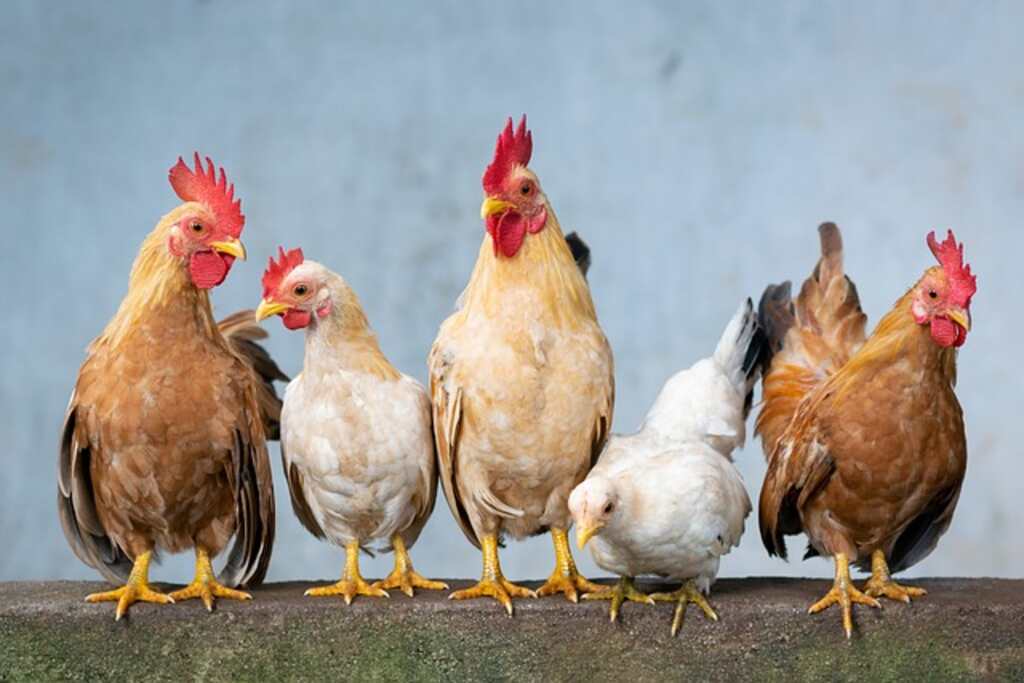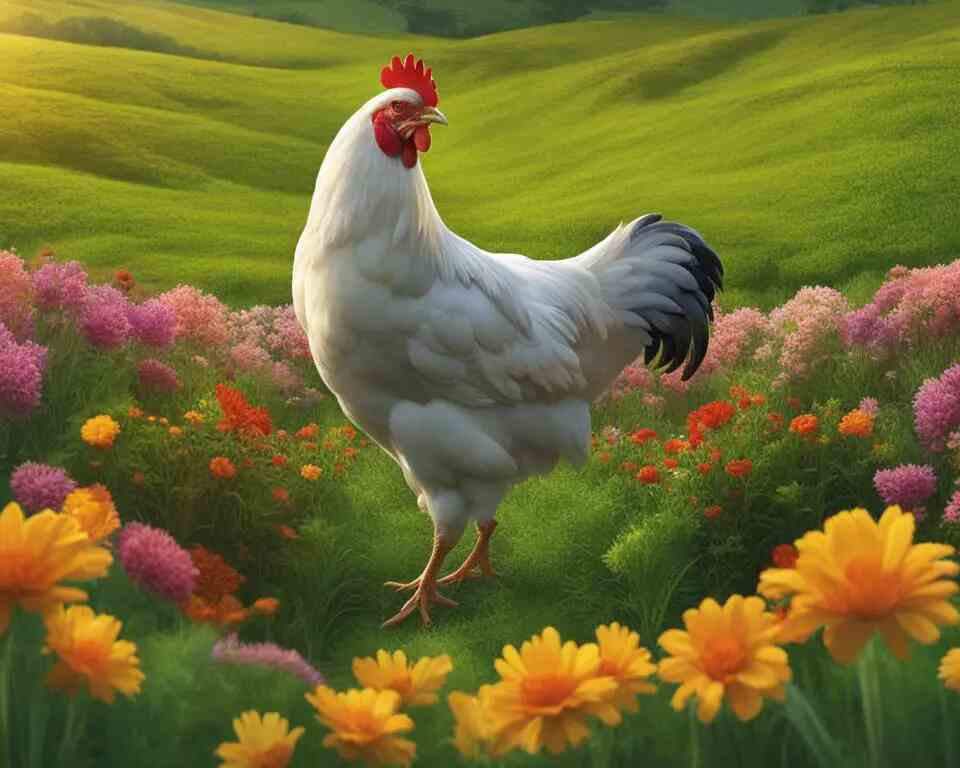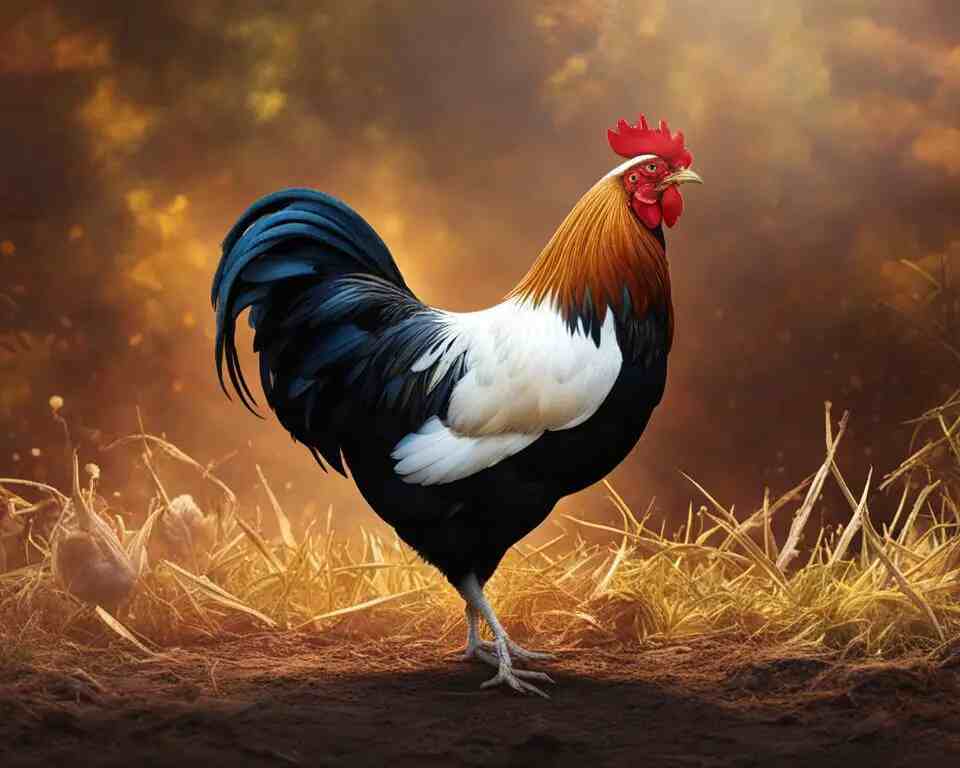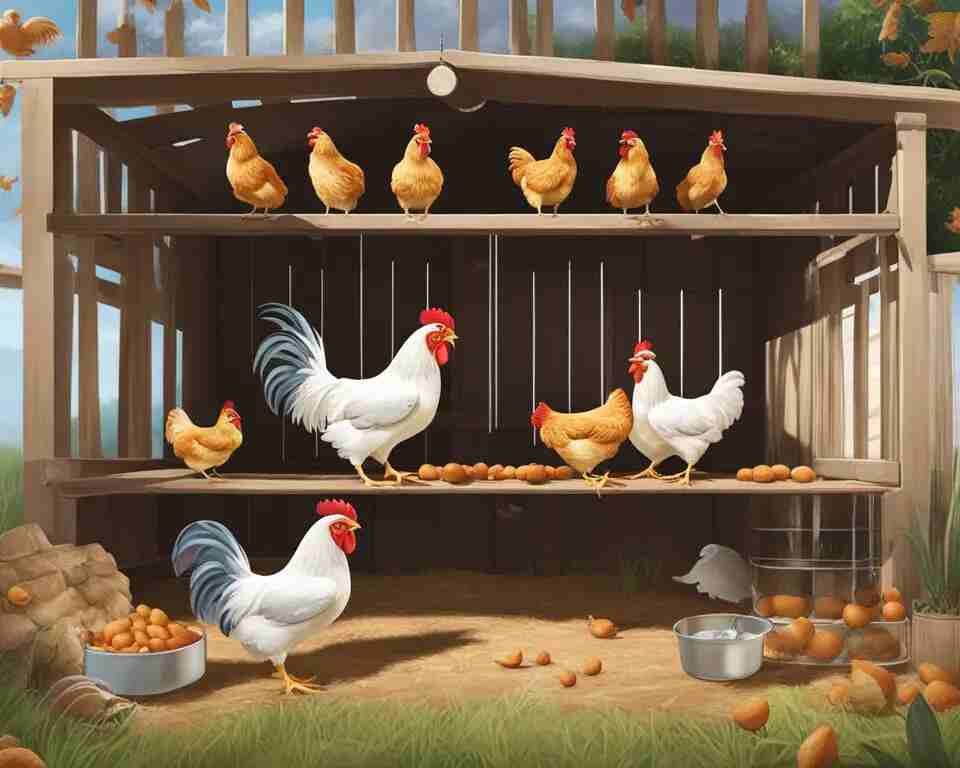Have you ever wondered how long chickens live? The lifespan of chickens can vary depending on various factors. In the past, chickens had a short lifespan, but with advancements in care and breeding, they can now live anywhere from 3 to 10+ years.
The breed of chicken along with such factors such as disease, housing, diet, environment, gentics, and veterinary care all play a role in determining a chicken’s longevity.
Table of Contents
- 1 Key Takeaways:
- 2 How Long Do Chickens Live?
- 3 History of Hens and Life Expectancy
- 4 The Lifespan of Chickens (Heritage Vs. Hybrid)
- 5 Factors Affecting Life Expectancy
- 6 5 Popular Chicken Breeds and Their Life Expectancy
- 7 Do Hens Live Longer than Roosters?
- 8 What Chicken Breeds Live the Longest?
- 9 Lifespan and Egg Production
- 10 Conclusion
- 11 FAQs:
- 11.1 What factors affect a chicken’s lifespan?
- 11.2 Do heritage hens live longer than hybrid hens?
- 11.3 What are some popular chicken breeds and their life expectancies?
- 11.4 Do roosters live as long as hens?
- 11.5 What chicken breeds live the longest?
- 11.6 What factors can affect a chicken’s lifespan?
- 11.7 How does egg production affect a chicken’s lifespan?
- 11.8 Do hens live longer than roosters?
- 11.9 What should I consider before keeping chickens as pets or for egg production?
- 12 Source Links
- 13 Author
Key Takeaways:
- Chickens can live from 3 to 10+ years depending on various factors.
- The breed of the chicken influences its lifespan.
- Factors such as disease, housing, diet, environment, genetics, and veterinary care affect a chicken’s longevity.
- Heritage hens generally live longer than hybrid hens.
- Landrace and heritage chicken breeds tend to have longer lifespans compared to hybrids.
How Long Do Chickens Live?
Chickens can live 3 to 10+ years, influenced by factors like breed, disease, diet, environment, and veterinary care. Heritage hens often outlive hybrids, with landrace breeds having longer lifespans.
History of Hens and Life Expectancy
Chickens have a rich history that dates back centuries, and their life expectancy has evolved significantly over time. Originally wild birds, chickens had a relatively short lifespan of only 2-4 years. However, in the mid to late 1800s, humans began selectively breeding chickens for specific traits, which ultimately led to changes in their behavior and increased productivity.
As a result, chickens today have a longer life expectancy, with backyard chickens living anywhere from 3 to 10+ years.
The life expectancy of chickens can vary depending on factors such as breed, breeding practices, and other environmental conditions. Heritage hens, which have been raised and bred naturally, tend to have longer lifespans compared to hybrid hens.
Heritage hens can live up to 8 years or more, while hybrids, bred for high egg production, may have a shorter lifespan due to reproductive issues.
The Impact of Breeding and Other Factors
Over time, selective breeding has had a significant impact on the life expectancy of chickens. Along with the purposeful breeding for specific traits, factors such as disease, housing, diet, environment, genetics, and veterinary care also play a role in determining a chicken’s longevity.
Today, advancements in chicken care and breeding practices have created a wide range of lifespans across different breeds and types of chickens.
The history of hens and the changes in their life expectancy reflect the close relationship between humans and these domesticated birds.
Understanding the factors that influence chicken lifespan can be helpful for backyard chicken keepers and enthusiasts who want to ensure the health and well-being of their flocks.
| Breed | Average Lifespan |
|---|---|
| Rhode Island Reds | 5-8 years |
| Plymouth Rock | 8-10 years |
| Silkie | 7-9 years |
| Orpington | 8-10 years |
| Wyandotte | 6-12 years |
The Lifespan of Chickens (Heritage Vs. Hybrid)
When it comes to the lifespan of chickens, there is a notable difference between heritage hens and hybrid hens. Heritage hens, which have been raised and bred naturally, tend to have a longer lifespan compared to their hybrid counterparts. These heritage hens can live up to 8 years or more, while hybrids, which are bred for high egg production, may have a shorter lifespan due to reproductive issues.
One reason for the difference in lifespan is that heritage hens have a more natural genetic makeup, allowing them to live longer and be more disease-resistant. On the other hand, hybrids are bred to lay a large number of eggs, which can put a strain on their reproductive system and overall health. As a result, their lifespan may be shorter.
Table: Lifespan of Heritage and Hybrid Chickens
| Chicken Breed | Lifespan (Years) |
|---|---|
| Heritage Hens | 8+ |
| Hybrid Hens | Varies, but generally shorter than heritage hens |
It’s important to note that industrial or commercial hens, which are typically hybrids, are often retired at around 18-24 months of age after their peak egg production. On the other hand, meat birds, which are bred for their meat rather than egg production, have a shorter lifespan and can be butchered as early as 5 weeks old.
When considering chickens for your flock, whether for egg-laying purposes or as pets, it’s important to weigh the benefits of hybrid hens’ higher egg production with the potential trade-off of a shorter lifespan.
Heritage hens may provide a longer companionship and still lay a respectable number of eggs, albeit not as many as hybrids. Ultimately, the choice between heritage and hybrid hens depends on your specific needs and preferences.
Factors Affecting Life Expectancy
Several factors can affect a chicken’s life expectancy. Understanding these factors is crucial for providing optimal care and ensuring the well-being of your flock. Here are some key factors that can influence the lifespan of chickens:
Housing:
The housing conditions play a significant role in a chicken’s overall health and longevity. Clean and well-maintained coops with proper ventilation and insulation help protect chickens from extreme temperatures and prevent the spread of diseases.
Diet:
A well-balanced and nutritious diet is essential for chickens’ growth and vitality. Providing them with a feed that meets their nutritional requirements, supplemented with fresh fruits, vegetables, and grains, ensures they receive the necessary nutrients to maintain their health and support their immune system.
Environment:
The environment in which chickens are raised can impact their lifespan. Access to a suitable outdoor area where they can engage in natural behaviors, such as scratching and foraging, enhances their mental and physical well-being. Providing a stress-free environment with adequate space and enrichment activities promotes a healthier and more fulfilling life for chickens.
Genetics and Breeding:
The genetics of a chicken can affect its lifespan. Breeding for specific traits can sometimes result in unintended consequences, such as health issues or reduced longevity. Opting for heritage breeds or naturally bred chickens, which have a more diverse and resilient genetic makeup, can contribute to longer lifespans.
Veterinary Care:
Regular veterinary care and preventive measures are essential for maintaining the health and well-being of chickens. Routine health check-ups, vaccinations, and timely treatment of any illnesses or injuries can help prolong their lifespan. Consulting with a poultry veterinarian for expert advice and guidance is highly recommended.
Disease and Parasite Control:
Diseases and parasites can significantly impact a chicken’s health and lifespan. Regular monitoring, proper hygiene practices, and implementing preventive measures such as vaccination and deworming can reduce the risk of diseases and parasitic infestations, ensuring chickens live longer, healthier lives.
By considering these factors and providing appropriate care, you can enhance the quality of life for your chickens and increase their lifespan.
5 Popular Chicken Breeds and Their Life Expectancy
When it comes to choosing chickens for your flock, it’s important to consider not only their appearance and temperament but also their life expectancy. Different breeds have varying lifespans, and understanding these differences can help you make informed decisions about the longevity of your chickens. Here are five popular chicken breeds and their average life expectancies:
| Chicken Breed | Average Life Expectancy |
|---|---|
| Rhode Island Reds | 5-8 years |
| Plymouth Rock | 8-10 years |
| Silkie | 7-9 years |
| Orpington | 8-10 years |
| Wyandotte | 6-12 years |
Please note that these life expectancies are averages and can vary depending on factors such as genetics, diet, living conditions, and overall care. It’s essential to provide your chickens with a healthy and comfortable environment to maximize their lifespan.
Additionally, individual chickens within a breed may live longer or shorter lives based on various factors specific to each bird.
Rhode Island Reds are well-known for their hardiness and adaptability, making them a popular choice for backyard flocks.
Plymouth Rocks are also highly regarded for their longevity and make excellent dual-purpose birds for both meat and egg production.
Silkie chickens, with their fluffy feathers and docile nature, can live for several years and are often kept as ornamental pets.
Orpingtons are known for their calm and friendly personalities and have a relatively long lifespan compared to other breeds.
Wyandottes are not only beautiful but also have a decent lifespan, making them an attractive option for both beginners and experienced chicken keepers.
Remember that while these breeds may have longer average life expectancies, individual variations can occur.
Taking good care of your chickens, providing them with a balanced diet, regular veterinary check-ups, and a safe environment can help ensure that they live healthy, happy, and fulfilling lives.
Do Hens Live Longer than Roosters?
When it comes to the lifespan of chickens, hens generally have longer lives compared to roosters. While the exact lifespan can vary depending on various factors such as breed and overall care, roosters often put themselves in more risky situations to protect their flock. They may engage in fights with predators or other roosters, which can lead to injuries or even death.
Hens, on the other hand, are generally less prone to engaging in risky behaviors, resulting in a potentially longer lifespan. However, there are instances where a rooster may outlive hens, attributed to the absence of the physical strain associated with egg production. However, it’s important to note that individual variations and circumstances can still impact the lifespan of both roosters and hens.
In terms of average lifespan, hens from different breeds can live anywhere from 3 to 10+ years, while roosters tend to have slightly shorter lifespans. However, it’s important to note that individual variations can occur within each breed, and factors such as genetics, disease, and overall care can also influence the lifespan of both hens and roosters.
Factors Influencing Lifespan
There are several factors that can affect the lifespan of chickens, regardless of gender. These include genetics, disease, housing conditions, diet, and access to veterinary care. Providing a suitable environment, a well-balanced diet, and regular health check-ups can contribute to maximizing the lifespan of both hens and roosters.
Additionally, practicing preventive measures, such as vaccinating against common chicken diseases, can help ensure a longer and healthier life for your flock.
| Breed | Average Lifespan of Hens | Average Lifespan of Roosters |
|---|---|---|
| Rhode Island Reds | 5-8 years | 4-6 years |
| Plymouth Rock | 8-10 years | 6-8 years |
| Silkie | 7-9 years | 5-7 years |
As shown in the table, hens generally have longer lifespans compared to roosters across different breeds. However, it’s important to remember that these are average lifespans, and individual chickens may live longer or shorter lives depending on their specific circumstances.
What Chicken Breeds Live the Longest?
When it comes to longevity, certain chicken breeds are known for their exceptional lifespan. Landrace chicken breeds, which have developed naturally without human intervention, are among the longest-lived. These chickens have strong immune systems and are naturally more disease resistant, allowing them to live longer lives.
Additionally, heritage chicken breeds, which have been bred for specific traits while maintaining a more natural genetic makeup, also tend to have longer lifespans compared to hybrids.
Landrace chicken breeds, such as the Chantecler and the Java, can live on average between 8 to 12 years. These breeds have adapted to their specific environments over time and have managed to maintain their genetic integrity, resulting in longer lifespans.
Long-Lived Chicken Breeds
Here are some long-lived chicken breeds along with their average lifespans:
| Chicken Breed | Average Lifespan |
|---|---|
| Chantecler | 8-12 years |
| Java | 8-12 years |
| Sussex | 7-9 years |
| Australorp | 6-8 years |
| Marans | 8-10 years |
These breeds are known for their hardiness, adaptability, and resistance to diseases, which contribute to their longer lifespans. If you’re looking for chickens that can be long-term companions in your backyard flock, considering these long-lived breeds may be a great choice.
Lifespan and Egg Production
When considering the lifespan of chickens, it’s important to distinguish between their overall lifespan and their productive lifespan for egg production. While chickens can live for several years, their peak egg-laying capacity is typically limited to around 2-3 years.
This means that even though a chicken may have many more years ahead of it, its egg-laying capabilities may decline significantly after the initial 2-3 year period.
Egg production is influenced by various factors, including the breed, genetics, and the natural aging process. Hens from production breeds, which are bred specifically for high egg production, may lay eggs almost every day for 18 months to 2 years, and then experience a decline in their laying capacity.
On the other hand, dual-purpose or heritage breeds tend to have a longer productive lifespan, even though their overall egg production may not be as intense as that of production breeds.
To illustrate this further, the table below provides a comparison of the productive lifespan and average number of eggs produced per year for three different chicken breeds:
| Breed | Productive Lifespan | Average Eggs Produced per Year |
|---|---|---|
| Rhode Island Reds | 2-3 years | 200-300 |
| Orpington | 3-4 years | 150-200 |
| Barred Plymouth Rock | 2-3 years | 200-250 |
Please note that these figures are approximate and can vary depending on individual chickens and their specific conditions. It’s also worth mentioning that after the productive lifespan, chickens can continue to live for several more years, providing companionship and other benefits, even if their egg production declines.
Conclusion
Now that you understand the lifespan of chickens and the factors that contribute to their longevity, you can make an informed decision about keeping them as pets or for egg production. Caring for chickens is a commitment that extends beyond a few years, as these feathered friends can live for over a decade.
When considering chickens, it’s important to choose the right breed based on your preferences and requirements. Keep in mind that heritage hens tend to live longer than hybrid hens, and landrace breeds have developed natural resilience against diseases.
Proper care is essential to ensure the health and well-being of your chicken flock. This includes providing a well-balanced diet, maintaining a suitable environment, and having access to veterinary care when needed. By prioritizing these aspects, you can maximize your chickens’ lifespan and enjoy the rewards of raising these fascinating creatures for years to come.
FAQs:
What factors affect a chicken’s lifespan?
Factors such as disease, housing, diet, environment, genetics, and veterinary care can impact a chicken’s lifespan.
Do heritage hens live longer than hybrid hens?
Yes, heritage hens typically have a longer lifespan compared to hybrid hens.
What are some popular chicken breeds and their life expectancies?
Here are the average lifespans for some popular breeds: Rhode Island Reds: 5-8 years, Plymouth Rock: 8-10 years, Silkie: 7-9 years, Orpington: 8-10 years, Wyandotte: 6-12 years.
Do roosters live as long as hens?
No, roosters tend to have shorter lifespans compared to hens.
What chicken breeds live the longest?
Landrace chicken breeds, which have developed naturally without human intervention, are known for having the longest lifespans.
What factors can affect a chicken’s lifespan?
Factors such as diet, environment, genetics, veterinary care, and disease can impact a chicken’s lifespan.
How does egg production affect a chicken’s lifespan?
While a chicken may live for several years, its peak egg production is usually limited to around 2-3 years. Afterward, egg production may decline.
Do hens live longer than roosters?
Yes, hens tend to live longer than roosters.
What should I consider before keeping chickens as pets or for egg production?
It is important to consider the breed, genetic factors, and other factors that affect a chicken’s lifespan before deciding to keep chickens.





